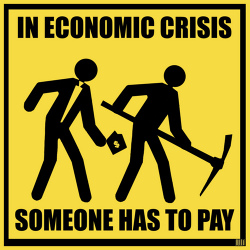Accueil > Elsewhere in Europe, around the world > How Shale Is Becoming The .COM Bubble Of The 21st Century
How Shale Is Becoming The .COM Bubble Of The 21st Century
dimanche 3 mai 2015
HOW SHALE IS BECOMING THE .COM BUBBLE
OF THE 21ST CENTURY
By Leonard Brecken of Oilprice.com

As I review the financials of one of the largest shale producers in the United States, Whiting Petroleum (WLL), I can’t help but notice the parallels to the .COM era of 1999 which, to some extent, has already returned to the technology and biotech sectors of today. Back then, the faster you burned cash to capture customers regardless of earnings to drive your topline, the higher your valuation. The theory was that after capturing the customers (in energy today, it is the wells) spending would slow and so would customer additions allowing companies to generate cash. By the way, a classic recent case is none other than Netflix (NFLX) which, in the past was exposed for accounting gimmicks that continue even today. It is still following this path of burning cash for the sake of customer additions, while never generating any cash in its entire existence.
Cash was plentiful in 1999 so it could always be raised as the Federal Reserve began its easy money era creating a series of bubbles for the next 15 years. Does this sound familiar to what is occurring now ? It will end the same way and that process has already started as currency wars heat up and our economy grinds to a halt proving QE does not, in fact, create wealth (temporary yes for the 1%, short term, until POP) but instead it destroys it by distorting asset prices, misallocating investments, and ultimately creating an equity crash.
We just witnessed this in energy, as all the economic stats that distorted the real underlying economic weakness in the economy led energy producers to overproduce while easy money fueled it and expanded speculation in the futures market. Back in 1999 did the internet companies adapt their business models ? Some which still survive today did, but most went bankrupt. The parallels here with energy are simply stunning as most E&P companies need to spend well over their operational cash flow in order to not only grow but to replace the wells that are producing tied to depletion. Money is free right ? Well we are witnessing the first stages now and it may not last, as junk bond investors in energy can attest.
Further, US equity markets are beginning to “realize” that the US economy isn’t better off vs. Europe and the US dollar begins to fade as it shows signs of correcting as well. The Fed clearly isn’t as accommodative by instantly launching QE4, for a host of reasons, thus potentially opening the door to a deeper correction vs. prior ones in order to get what the 1% wants again : more QE. Yes the Keynesian feedback loop is real as, in the past, each equity correction was met with more QE.
WLL, in its March quarter, generated over $200M in cash from operations and, with hedges and production expected to be flat sequentially for rest of year in 2015, expects to earn at least $850M in cash from operations, give or take. The problem is though, they need to spend $2B to keep it up because depletion rates are so high. They claim “growth” capital expenditures are discretionary (just like NFLX by the way, in capturing customers), but the realities are that wells in the Bakken deplete 80% in 12 months, so does that really sound discretionary ?
What is worse is WLL continues to grow production even though prices have collapsed and cash generation is in decline. In fact, year over year cash generated from operations fell 30% despite production growing some 70% plus percent. Does this sound like a company you want to invest in or like one that is run efficiently ? So, let’s review : .com companies did the same and the majority went bankrupt so if WLL and other E&P companies continue to spend cash well above their operation capacity, not because they want to but because they have to, it will lead to the same result as it did in 2000… POP !
Most of these E&P companies who do not adapt will go bankrupt as the money runs dry, unless they spend within their operational CF. As of now, WLL specifically does not seem to be adapting as production rises this year and next. On their EPS call, management did say next year CF would fully cover capital expenditures which is encouraging, assuming current strip. Those companies that do adapt will not only survive but will thrive, as we believe that the ultimate result of all this will be much higher oil prices from here. The shale revolution will see a dramatic period of slow growth/no growth or more likely declining production as marginal players leave and costs to drill overall, outside of most prolific areas (as they run dry), rise. And as a reminder, OPEC does not have the spare capacity in hand to supply the market leading to the next boom in prices longer term. In the short term and as a rule of thumb, do not invest in those companies who spend considerably above the operation cash flow and only consider those that respect their limits.
Read more (with links) by Leonard Brecken of Oilprice.com
What Is Triggering Recent M&A Activity In The Energy Sector ?
Why The US Should Worry About Oil Sector Jobs
We Are Witnessing A Fundamental Change In The Oil Sector
 Stop Gaz de Schiste - France - Ardèche
Stop Gaz de Schiste - France - Ardèche